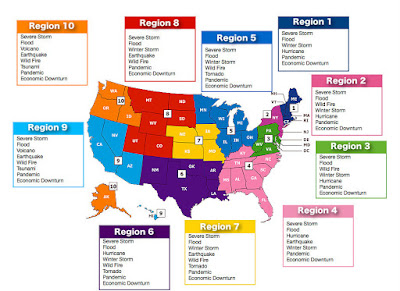EMERGENCY ACTION PLANNING > Blog > Planning > It Wont Happen Here
It Wont Happen Here
thesurvivalplaceblog.com
A deep seated hope that it won’t happen here;
Interest in actually doing something to prepare for emergencies usually surges after a major disaster. The flooding in the mid-west, Hurricane Katrina, and 9/11 all saw resurgence in emergency preparedness. Though as time passes, the collective consciousness tends to lose focus on the fact that something bad happened in the near past. Football games, the Olympics, television, work, and other events start to re-exert influence in the community. Preparing for the negative effect of future events gets pushed farther down the scale of need to do things. Deep back in our reptile brain there is the nagging knowledge that something wicked this way comes. But what the heck let’s just hope it won’t happen in our lifetime. Unfortunately hope is not a plan.
Blissful ignorance;
People come and go, and the new comers are lacking in the shared knowledge of the longstanding group. So they haven’t the foundation to form a decision based on actual events that have happened within the community. They see no reason to make any preparations, and most often they won’t. After all no one else they know is.
Classic head in the sand syndrome;
Denial; in ordinary English usage, is asserting that a statement or allegation is not true. The same word, and also abnegation, is used for a psychological defense mechanism postulated by Sigmund Freud, in which a person is faced with a fact that is too uncomfortable to accept and rejects it instead, insisting that it is not true despite what may be overwhelming evidence.
The subject may use:
Simple denial: deny the reality of the unpleasant fact altogether
Minimization: admit the fact but deny its seriousness (a combination of denial and rationalization)
Projection: admit both the fact and seriousness but deny responsibility by blaming somebody or something else.
(Wikipedia 2014)
We love you please don’t do that;
Depending on your peer group any attempt to become proactive and start to do something could be shot down. Now it’s not because the naysayer wants to see harm or misfortune to come to you. No No No. It’s more likely they have failed to do anything, and don’t want to be left out in the cold all by themselves. So it is socially acceptable to prevent you from protecting yourself and loved ones, since they have done nothing to protect themselves or their loved ones. Besides misery loves company.
Really, it won’t happen here;
Most all cities, towns, and metropolises have had something compared to a disaster, or a serious emergency happen within its confines at some time or another. Though nothing has happened within the last few years or so it doesn’t mean that nothing will happen. So if you’ve the idea that it won’t happen here. Do some research, checkout your local news agency/paper. They will probably have a wealth of historical information on the local misfortunes.
Time, distance and shielding;
The time, distance and shielding concept is normally related to protection from radiation exposure. And we can use the analogy to explain why some people will not create an Emergency Action Plan for emergencies or disasters that are historically relevant to where they live.
Time: The last major earthquake to strike the Continental US causing major loss of life and property damage was Loma Prieta 1989. That was 26 years ago. So much time has passed that people living in the area now, are either too young to remember it, or the memory has been collectively replaced by other events.
Distance: The farther away you are from a major emergency or disaster at the time they occur. The less likely you are to be bothered by it to such a degree that you might do something about it.
“There but for the grace of God go I” – John Bradford
Shielding: Can be idealized in multiple concepts. Having enough between you and the event that it will not harm you. In a military sense, having enough concrete, bricks, sandbags to stop the incoming rounds. You can use this to protect from flooding by building a waterproof berm around your house, shielding it from the flood waters. Mobs and rioters use this as a way to protect themselves from arrest or exposure by having so many other people around them. Terrorists shield themselves by integrating into the local population hiding in plain sight, and if necessary using the locals as ablative shielding.
People are afraid of what they don’t know, they will avoid what they fear, and procrastinate if they don’t see an immediate reward, the task is time consuming, possibly tedious, and the subject matter is less than pleasant.
Do some homework, Local news agencies are a wealth of information on the history of emergencies or disaster for all municipalities.
Till next time
![]()
“Be Safe”
